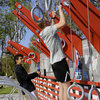Public invited to comment on the next step for Conkling Hall
RENSSELAERVILLE — The future of Conkling Hall, a community gathering place for well over a century, hangs in the balance.
The general public has been invited to a May 28 meeting at 11 a.m. at the hall on Methodist Hill Road to discuss the transfer of ownership of the building from the Rensselaerville Presbyterian Church to the organization that currently oversees its operations — The Friends of Conkling Hall Inc.
This meeting will be the start of what Gayle Burgess described as a “huge process” that, she said, ends with either the state’s attorney general or Supreme Court approving the transfer. Burgess is an elder at the presbyterian church and also serves on its governing board.
Conkling Hall has passed through many hands since it was built in 1839 as a Methodist church. At the turn of the last century, it was bought by Francis Conkling Huyck and made into a community center. “In the 1940s, the hall was gifted to the volunteer fire company,” said Burgess.
“In the 1990s, it went into foreclosure and people in the community moved quickly. The Rensselaerville Presbyterian Church organized a loan for the purchase of Conkling Hall,” said John Arrighi, a Friends of Conkling Hall board member and program committee chairman. The sale was completed in 1999.
Burgess said that $154,996 was raised in three months to buy the building and pay the back taxes and other fees. The two women who led the fund drive, Barbara Dudley and Marge Rooney, wife of the famous columnist, have since died and it is hard to piece together “the history of the process,” said Burgess. “Most of the people involved, I’m sorry to say, have passed on.”
She did say, “It was decided at the time, it was appropriate for the church to take responsibility for the building so it would not go into private hands.”
“Within fairly short order, the church had got sufficient funds from the community to pay off the loan,” Arrighi concurred. “They set up a separate board to run Conkling Hall and their vision was for the building to be transferred to this board at some point in the future. That is essentially what we are proposing to do now.”
The board was named The Friends of Conkling Hall. Arrighi said that they have been responsible for maintenance and operations of the building while The Rensselaerville Presbyterian Church has taken care of any needed improvements.
The Conkling Hall Committee, which has been in place since 2000, was set up originally with half church members and half community members, said Burgess. “They set the standard for how the hall would be run and the types of activities.” These have included everything from jazz concerts to yoga classes.
“Gradually, the Conkling Hall Committee took more and more upon itself,” said Burgess, “and fewer and fewer members of the church were involved.”
“I would say that the hall has done extremely well thanks to both organizations,” Arrighi said. “It has fulfilled its promise to the community.”
During the past year, The Friends of Conkling Hall submitted an application to the Internal Revenue Service to become a registered not-for-profit — which will allow the organization to solicit tax-deductible donations independently.
“We have proposed that the church now follow through on its early intention so that the building can be owned, maintained, and operated by The Friends of Conkling Hall,” Arrighi said.
Although he has heard of no pushback from The Rensselaerville Presbyterian Church to the idea, Arrighi added that there have been questions.
“I don’t see animosity within the church or resistance to doing this,” he said. “They just want to make sure that it is the right thing to do and that, if it is done, that the proper procedure is followed. I believe that most people in the church understand that the money that has been donated is for the purpose of keeping Conkling Hall well maintained, open, and available for the community.”
The May 28 meeting has a twofold purpose: to inform the community of the proposal and to garner feedback.
“After that, there will be various approval processes,” Arrighi said. “I don’t anticipate a lot of problems but we want to make sure it is done properly.”
“There’s a process we have to go through,” said Burgess of the church. “First, the Session, the ruling body of the church, has to recommend the hand-off. Some of the six,” she said of the Session members, “would like to wait till after the meeting to hear public comments.
“Once the Session makes a recommendation, the church membership votes on whether to transfer the building. Then we have to go to the Albany Presbytery,” which governs all the Presbyterian churches in the Capital District, she said.
“And then, depending on state rules, we either have to go to the attorney general or the Supreme Court to rule. We’re hoping, if we do the transfer, it will take place within this year.”
“It’s very exciting,” said Burgess. Describing her own feelings about the transfer, she said, “I feel it’s in good hands...Certainly, there would be a variety of issues to be resolved if it doesn’t happen. I see it as a positive move.”



